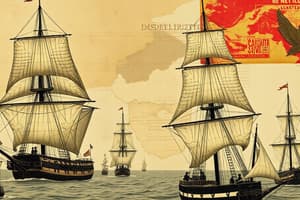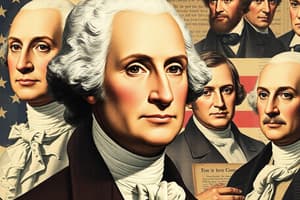Podcast
Questions and Answers
What was one of the primary reasons the South seceded from the Union?
What was one of the primary reasons the South seceded from the Union?
- Support for the Emancipation Proclamation
- Economic growth in the North
- Concerns over the abolition of slavery (correct)
- Desire for increased federal control
What was the main purpose of the Emancipation Proclamation?
What was the main purpose of the Emancipation Proclamation?
- To preserve the Union at any cost
- To encourage Southern states to rejoin the Union
- To free slaves in Confederate states (correct)
- To abolish slavery in border states
Which of the following amendments guarantees voting rights for African American men?
Which of the following amendments guarantees voting rights for African American men?
- 12th Amendment
- 15th Amendment (correct)
- 19th Amendment
- 14th Amendment
What was a significant negative consequence of the Reconstruction era?
What was a significant negative consequence of the Reconstruction era?
Which speech is known for highlighting sacrifices made for equality and national unity during the Civil War?
Which speech is known for highlighting sacrifices made for equality and national unity during the Civil War?
What principle did John Locke contribute to the Enlightenment that influenced revolutionary ideas?
What principle did John Locke contribute to the Enlightenment that influenced revolutionary ideas?
How did the Boston Tea Party serve the colonial cause?
How did the Boston Tea Party serve the colonial cause?
What was a significant outcome of the Articles of Confederation?
What was a significant outcome of the Articles of Confederation?
What was the impact of the Great Awakening on American society?
What was the impact of the Great Awakening on American society?
What was the key reason for the Missouri Compromise?
What was the key reason for the Missouri Compromise?
What did the Preamble of the Constitution emphasize?
What did the Preamble of the Constitution emphasize?
What event signified a major step towards American independence?
What event signified a major step towards American independence?
What did the Enlightenment thinkers generally advocate?
What did the Enlightenment thinkers generally advocate?
Flashcards
Emancipation Proclamation
Emancipation Proclamation
The Emancipation Proclamation declared that slaves in Confederate states were to be freed, yet it did not apply to those living in Border states. This was a major step towards abolishing slavery, though it didn't encompass all enslaved people during the civil war.
Gettysburg Address
Gettysburg Address
A key turning point in the Civil War, the Gettysburg Address, delivered by President Lincoln, highlighted the sacrifices of the war to solidify national unity and emphasize the pursuit of equality.
Reconstruction Amendments
Reconstruction Amendments
The 13th, 14th, and 15th Amendments were pivotal for racial equality in the US. The 13th abolished slavery, the 14th guaranteed citizenship and equal protection, and the 15th granted voting rights to African American men.
Freedmen's Bureau
Freedmen's Bureau
Signup and view all the flashcards
Reconstruction
Reconstruction
Signup and view all the flashcards
Manifest Destiny
Manifest Destiny
Signup and view all the flashcards
Declaration of Independence
Declaration of Independence
Signup and view all the flashcards
Intolerable Acts
Intolerable Acts
Signup and view all the flashcards
Great Awakening
Great Awakening
Signup and view all the flashcards
Articles of Confederation
Articles of Confederation
Signup and view all the flashcards
Missouri Compromise
Missouri Compromise
Signup and view all the flashcards
Enlightenment
Enlightenment
Signup and view all the flashcards
Abolitionist movement
Abolitionist movement
Signup and view all the flashcards
Study Notes
Early American Development
- Puritans sought religious freedom but established strict, theocratic colonies, impacting early American identity through hard work and community values.
- The Great Awakening, a religious revival, challenged traditional authority, encouraging emotional faith and paving the way for questioning political authority.
- The Enlightenment emphasized reason and science; thinkers like Locke and Montesquieu influenced the Declaration of Independence with concepts of natural rights and separation of powers.
American Revolution
- Key acts like the Sugar, Stamp, and Townshend Acts fueled colonial resentment due to taxation without representation.
- The Boston Massacre and Boston Tea Party (and subsequent Intolerable Acts) intensified colonial resistance and spurred unified action.
- The Continental Congresses (First and Second) led boycotts, petitions, and ultimately, declarations of independence.
- Articles of Confederation formed the first U.S. government but proved too weak, leading to issues like Shays' Rebellion.
Founding and Expansion
- The Declaration of Independence, written by Jefferson, asserted unalienable rights (Life, Liberty, and Pursuit of Happiness) while justifying rebellion.
- The Constitution established a stronger federal government, though it avoided directly addressing slavery to maintain unity.
- Territorial expansion, including the Louisiana Purchase, boosted the U.S. but also fostered disagreements over slavery.
- Manifest Destiny, the belief in westward expansion, further divided the nation.
- The Missouri Compromise aimed to balance free and slave states but only temporarily resolved the conflict over slavery's future.
Civil War and its Aftermath
- Disagreements over slavery and federal overreach fueled the Civil War. The South feared loss of slavery; the North initially fought to preserve the Union, then for abolition.
- Key documents and leadership during the Civil War included Lincoln’s Emancipation Proclamation (freeing slaves in Confederate states) and the Gettysburg Address (highlighting the nation's unity and freedom values).
- The 13th Amendment abolished slavery, and Reconstruction efforts aimed to rebuild the South and integrate freed people into society.
- Despite successes in granting African Americans political and civil rights, Reconstruction's failures led to the Compromise of 1877, which ended Reconstruction and allowed Southern segregation and disenfranchisement to rise.
Post-Civil War Challenges
- The Freedmen's Bureau provided aid to freed slaves; however, sharecropping often trapped them in cycles of poverty.
- Jim Crow laws and Black Codes limited freedoms and opportunities.
- Ultimately, the gains of Reconstruction were short-lived, highlighting the continued struggles for equality.
Studying That Suits You
Use AI to generate personalized quizzes and flashcards to suit your learning preferences.




